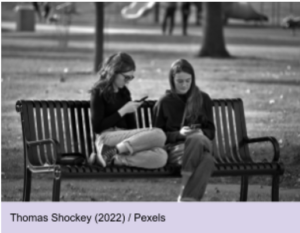New findings highlight the effects of using smartphones together and coping strategies.
Blogpost written by Tamás Lukács and Tianci Chen
KEY POINTS
- Being on your phone during social interactions affects everyone involved negatively
- Using phones together promotes bonding between each other
- The way we address issues related to smartphone usage during social interactions also plays an important role
We all know the feeling of being phubbed – being ignored because someone else is immersed with their smartphone during a conversation: We feel excluded and might even question if we are worth their time. But what about our own smartphone engagements during social interactions or using a smartphone together? And are there ways we can address these issues to moderate our feelings when we are being phubbed?

Previous studies showed that phubbing occurs in a large portion of our daily conversations, however the exact effects on our social relationships still haven’t been fully explored. To find out more about this, a recent survey with 840 young adult smartphone users unraveled the effects of phubbing, i.e. ignoring someone else by engaging with our smartphone, being phubbed and co-use, i.e. watching a video together on a smartphone, on perceived friendship satisfaction and social isolation.
Being Phubbed and Phubbing
As expected, being phubbed leads to a decrease in friendship satisfaction (-12%) and increases feelings of social isolation (28%), which can result in a psychological distance that may impact your individual mental well-being.
But beware that feelings of social isolation were also evoked through engaging in phubbing yourself (19%). This could be due to feeling less included through engaging with your smartphone instead of with your friends and goes hand-in-hand with the concept of absent presence, i.e. physically being there but your mind being somewhere else, namely on your smartphone.
However and contrary to popular belief, the study uncovered that phubbing didn’t directly impact your perception of friendship satisfaction. The reason could be the omnipresence of smartphones. This means that users are already able to communicate effectively while engaging with their smartphones or smartphone usage is already expected within close- friendship social settings and thus doesn’t affect friendship satisfaction.
Using a Smartphone Together
The survey also included questions about the mutual use of smartphones in social settings as there hasn’t been much research done about the effects of using your smartphone as a means for social interaction, such as watching a video together. The results indicate a positive effect on friendship satisfaction (52%) and participants perceiving being less socially isolated (-14%). So why not show your friend the funny dog videos you are watching anyway during the time you spend together?

“Hey, talk to me!”
The survey suggests that coping strategies, i.e. the way you deal with being phubbed, might ease the burden of being phubbed on your perceived friendship satisfaction and social isolation. Coping strategies can be direct , i.e. expressing that you would like your friend to get off their smartphone, or avoidant, i.e. mirroring behavior and scrolling through social media yourself.
The authors found that direct coping strategies helped to reduce the negative effects of being phubbed on friendship satisfaction (6%). The impact was smaller for those less likely to make use of such means. However, the effect was insignificant for participants that were more likely to use direct coping strategies.
On the other hand, avoidant coping strategies strengthened the link between being phubbed and perceived social isolation (6%). It was also the more favored coping strategy among the young adults. Both findings indicate that it might be worth reminding your friends, once in a while, that they are supposed to be spending time with you and not with their smartphones.
Final Thoughts
It is difficult to navigate through the high seas of social interactions in our time of constant interconnectedness through our smartphones. But given these findings, the authors provide some practical suggestions for handling smartphone usage in live conversations. Firstly, addressing the issue with our conversation partner is crucial, as avoiding it only promotes social isolation. Minimizing phone-related distractions, i.e. muting calls and notifications, discussing clear boundaries for smartphone use, and encouraging joint smartphone activities are also among the recommendations.
When we find our partner’s phubbing behavior annoying it is also best to address the issue directly rather than avoiding talking about it or looking at the smartphone ourselves. If we must use our smartphones however, it is best to include the other person somehow, if we are only looking at funny dog videos anyway. These tips might mitigate disruptions in our conversations.
Knowing all these, of course, won’t solve every phubbing-related misunderstanding with your friends or partner; however, hopefully, now you have the tools to navigate these situations better and engage in more connected conversations in your friendships.
References
Stevic, A., & Matthes, J. (2023). Co-present smartphone use, friendship satisfaction, and social isolation: The role of coping strategies. Computers in Human Behavior, 149, 107960. https://doi.org/https://doi.org/10.1016/j.chb.2023.107960